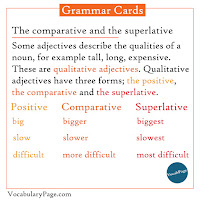The comparative and the superlative
Some adjectives describe the qualities of a noun, for example tall, long, expensive. These are qualitative adjectives. Qualitative adjectives have three forms; the positive, the comparative and the superlative.
Positive
|
Comparative
|
Superlative
|
big
|
bigger
|
biggest
|
slow
|
slower
|
slowest
|
difficult
|
more difficult
|
most difficult
|
Comparative adjectives
A comparative adjective is used to express a difference between two things. For example, bigger is the comparative form of big. We use the comparative when we want to compare two nouns. The preposition than is used after a comparative adjective in order to introduce the second part of a comparison.
- He needs stronger painkilling drugs.
- I'm trying to find a better job.
- He’s older than me.
- My daughter is taller than my wife.
- He was more intelligent than his brother.
Superlative adjectives
A superlative adjective expresses the greatest degree of a quality. For example, biggest is the superlative form of big. We use the superlative to compare one person or thing with all other people or things in a group. Remember to use the definite article before a superlative.
- He is my best friend.
- What’s the highest mountain in the world?
- It was the happiest year of my life.
- She is the tallest girl in her class.
Forming comparative and superlative adjectives
We form the comparative and superlative in different ways, depending on the number of syllables in the base adjective.
Adjectives with one syllable
If the adjective has one syllable, the suffix -er is added to the end to form the comparative. The suffix -est is added to form the superlative.
quick
|
quicker
|
quickest
|
big
|
bigger
|
biggest
|
fat
|
fatter
|
fattest
|
sad
|
sadder
|
saddest
|
hot
|
hotter
|
hottest
|
We double the final letter when the adjective ends in consonant+vowel+consonant.
Adjectives with two syllables
Some adjectives with two syllables take the suffixes -er and -est.
narrow
|
narrower
|
narrowest
|
simple
|
simpler
|
simplest
|
tiny
|
tinier
|
tiniest
|
Note: If the adjective ends in -y, change y to i before adding -er or -est.
Some use more to form the comparative and most to form the superlative.
useful
|
more useful
|
most useful
|
bored
|
more bored
|
most bored
|
Note: More or most is not used with the -er or -est form of an adjective.
Adjectives with three or more syllables
All adjectives with three or more syllables use more and most.
interesting
|
more interesting
|
most interesting
|
difficult
|
more difficult
|
most difficult
|
Irregular adjectives
Some common adjectives have irregular comparative and superlative forms.
good
|
better
|
best
|
bad
|
worse
|
worst
|
little
|
less
|
least
|
much
|
more
|
most
|






Yorumlar
Yorum Gönder